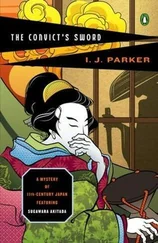I. Parker - The Crane Pavillion
Здесь есть возможность читать онлайн «I. Parker - The Crane Pavillion» весь текст электронной книги совершенно бесплатно (целиком полную версию без сокращений). В некоторых случаях можно слушать аудио, скачать через торрент в формате fb2 и присутствует краткое содержание. Жанр: Исторический детектив, на английском языке. Описание произведения, (предисловие) а так же отзывы посетителей доступны на портале библиотеки ЛибКат.
- Название:The Crane Pavillion
- Автор:
- Жанр:
- Год:неизвестен
- ISBN:нет данных
- Рейтинг книги:5 / 5. Голосов: 1
-
Избранное:Добавить в избранное
- Отзывы:
-
Ваша оценка:
- 100
- 1
- 2
- 3
- 4
- 5
The Crane Pavillion: краткое содержание, описание и аннотация
Предлагаем к чтению аннотацию, описание, краткое содержание или предисловие (зависит от того, что написал сам автор книги «The Crane Pavillion»). Если вы не нашли необходимую информацию о книге — напишите в комментариях, мы постараемся отыскать её.
The Crane Pavillion — читать онлайн бесплатно полную книгу (весь текст) целиком
Ниже представлен текст книги, разбитый по страницам. Система сохранения места последней прочитанной страницы, позволяет с удобством читать онлайн бесплатно книгу «The Crane Pavillion», без необходимости каждый раз заново искать на чём Вы остановились. Поставьте закладку, и сможете в любой момент перейти на страницу, на которой закончили чтение.
Интервал:
Закладка:
Tora added, “And you’d better tell us about his women. Maybe it wasn’t the money that was the motive, but his womanizing. Maybe he mistreated some women in the quarter. The owner of one of the houses might have paid someone to get rid of him. Or maybe he raped some young girl and her father took revenge.”
Nakamura’s son cried, “My father didn’t rape young girls. That’s a dirty lie. Who told you about that?”
Tora cocked his head. “So there was something? Doesn’t matter if it’s true or not as long as someone believed it. You’d better tell us everything you know, if you want us to solve your father’s murder.”
The son glared. “We’ve changed our minds. We don’t want you to go on with this. It’s very unpleasant to have such lies stirred up.”
Saburo looked at Saito. “You’ve said very little. Are you also content to leave matters as they are? You know it could be dangerous.”
Saito glanced at the younger man. “We’d better tell them about the note,” he said.
The son shook his head. “No. You know what he said. Not a word must get out.”
Saburo asked quickly, “What is it, Saito? Who has contacted you?”
Nakamura’s son rushed over to grasp Saito’s arm. “Don’t tell them!” he pleaded.
Saito shook him off. “We’ve received a warning to leave things alone.” His nephew collapsed, moaning.
“A warning?” Tora raised his brows. “Do tell!”
Saito glanced at the young man. “My nephew is afraid. The warning came from Kanemoto.”
“The gangster boss Kanemoto? How interesting! What did it say?”
Saito pulled a crumpled piece of paper from his sleeve and handed it over. Tora and Saburo bent over it together. The writing was large and careless, the characters malformed, but the message was clear: “You’ve been meddling! Leave it alone or you’ll be sorry. The police have the killer!”
Nakamura’s son cried, “Now you’ve done it. He’ll have killed, too.”
His uncle grimaced. “Be calm,” he told his nephew. “This man has spoken to the chief of the police. If anyone can protect us, it’s them.”
“As if the police cared about people like us!” protested his nephew.
Tora thought he had a point. He did not feel a great urge to return to Kobe and ask him to protect the Nakamura clan. But for the time being, he pretended willingness to be of help. “How is it that Kanemoto’s involved in this? What sort of business did you and your partner have with Kanemoto?”
Saito said, “I never met the man. I think my brother must’ve become involved over some deals he made in the willow quarter.”
Tora considered this. It made sense. Kanemoto was the sort of gangster who made his profits from gambling and prostitution. Because he had never, to their knowledge, been known to resort to violence, the police had turned a blind eye to his activities. Perhaps this had changed. Kanemoto had just become a suspect. But proving his guilt would be dangerous and might draw his attention not only to himself and Saburo. It might well also involve the whole Sugawara household. They would have to be very careful.
He said, “We’ll be back. Meanwhile, don’t tell anyone that you’ve talked to us.” He glanced with a frown at Saito’s nephew, who was still moaning and muttering.
Saito asked anxiously, “You will speak to the superintendent? About protection and to make sure they arrest Kanemoto and his gang?”
Tora said vaguely, “We’ll share our information with the police. And we’ll be back in case there are more messages from Kanemoto.”
Saito nodded glumly.
Outside the house, Tora rubbed his hands with satisfaction. “Couldn’t be better,” he said. “This will interest Kobe greatly. You’ll see your blind girl will be out in no time.”
Saburo thought about it. Perhaps Shokichi would forgive him then, but he no longer wanted to be forgiven. He was better off alone than with a wife who burst into angry recriminations whenever he did not do as she wanted. Perhaps he might tolerate such behavior in a mistress, but certainly not in a wife. Yes, why not? She could be his mistress. And he could leave whenever she behaved badly; she would soon learn to behave. The thought cheered him. “What next?” he asked Tora.
“Well, since Kanemoto hangs out in the willow quarter, we should go there.” Tora looked up at the moon. It was a cold clear night. “Come along, the day has started for the whores and gamblers.”
They returned home briefly to exchange their sober blue robes with the black sashes for the cheap but colorful clothing of young men bent on a night out.
As they walked through the empty streets on this cold night, Saburo became glum again. It troubled him that he always seemed to be in the wrong, not matter how hard he tried to please his master. He was beginning to suspect that he had never been forgiven for his past life as a spy or agent. In the end there had still been a certain dislike, a lack of trust, and whenever his lordship thought he saw something in Saburo’s actions that displeased him, the old prejudice emerged. That would never change.
But apart from the vague hope that Shokichi might change her mind, this time something else motivated Saburo to disobey. It was not only the arrest of the blind girl, though he did feel sorry for her. It was the memory of that schoolmaster, bent over his endless copying work with red-rimmed eyes as his hungry family watched. What would happen to them when winter came? That broken roof would collapse under the first snow, and they had no money for fuel. They would freeze to death if hunger had not killed them first.
Shivering in the wind and with this image before his eyes, Saburo followed Tora into the world of pleasures offered by the willow quarter. As soon as they passed under the gaudy gate, they were surrounded by lights, colors, sounds, smells of food and perfumes, and the sense that everyone was dancing in the streets.
Nobody danced, of course, but the busy scene with the colorful costumes of the women, the laughter of the men, and the sounds of music being played in wine shops, eating places, and houses of assignation gave the impression of joyous abandon.
Tora smiled happily as he looked around, and Saburo gave him a sour look. Tora’s visits to the quarter had become severely curtailed since his marriage and life as a husband and father, but he had clearly missed it.
“I wonder if the Bamboo Grove is still there,” Tora said. “Not first-class, but a lively place. They always had fresh young girls from the provinces, decent wine, and good card games.”
Saburo grimaced. “And how are those things going to help us find a gangster boss?”
Tora raised his brows. “You’re in a bad mood a lot lately, brother. There’s gambling everywhere. Gamblers know each other. If you’re serious about gambling, you make a study of your opponents. That means you watch and try to draw them out. Gamblers know what’s going on.”
“If you say so.” Saburo glared at the painted young women who made determined efforts to lure them into the premises where they worked. One put out her tongue at him and turned her attention to someone else.
Tora dealt with them by grinning and joking with the women, claiming that his wife would beat him if he succumbed to their charms. This sort of thing was clearly mutually enjoyable, and Saburo thought bitterly that he just did not have the knack for attracting women.
The Bamboo Grove still existed. It was now a wine shop catering to working men and small tradesmen, but it was still as lively as Tora remembered, and in the back room a noisy game of dice was being played.
Tora said wistfully, “I wish we had some funds. All I have is a string of coppers and one piece of silver. What about you?”
Читать дальшеИнтервал:
Закладка:
Похожие книги на «The Crane Pavillion»
Представляем Вашему вниманию похожие книги на «The Crane Pavillion» списком для выбора. Мы отобрали схожую по названию и смыслу литературу в надежде предоставить читателям больше вариантов отыскать новые, интересные, ещё непрочитанные произведения.
Обсуждение, отзывы о книге «The Crane Pavillion» и просто собственные мнения читателей. Оставьте ваши комментарии, напишите, что Вы думаете о произведении, его смысле или главных героях. Укажите что конкретно понравилось, а что нет, и почему Вы так считаете.












